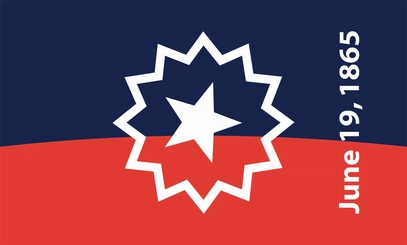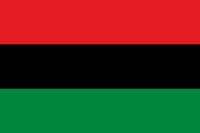Juneteenth (also known as Freedom Day or Emancipation Day) commemorates the end of African-American slavery in the U.S. It is one of the most poignant dates in American Black history.
With Juneteenth 2022 fast approaching, we answer the top questions about the holiday and explore the history behind it.
June 19 – hence the name! (June + nineteenth = Juneteenth.)
Originating in Texas, Juneteenth has been celebrated since 1879. And last year (2021) President Biden made it a federal holiday.

The official Juneteenth flag (right) consists of the American flag colors, and two stars in the center. The five-point star represents Texas (as the Lone Star State) but also the freedom of enslaved people in all 50 states. The larger star around it signifies a new beginning for African Americans. In 2007, white text was added to the right side of the flag: June 19, 1865.
Many people also use the Pan-African flag (below) to represent Juneteenth.

Juneteenth was founded at the end of the Civil War, when the Union (Northern states) wanted to abolish slavery, but the Confederates (Southern states) did not.
At the beginning of 1863, in the middle of the Civil War, Abraham Lincoln issued a piece of legislature that supposedly freed enslaved people in the 11 Confederate states. This was called the Emancipation Proclamation.
But it wasn’t until the end of the Civil War, when the Union military defeated the Confederacy, that enslaved people fully gained, and began to learn of, their legal right to freedom.
On June 19, 1865, Union General Gordon Granger arrived in Galveston, Texas, and shared the news with the African-American population. Word spread through the state, eventually reaching all 250,000 enslaved people there.
That December, slavery in America was formally abolished with the adoption of the 13th Amendment.
The holiday still commemorates the day that Texan slaves learned of their liberation, but in the wake of the murders of George Floyd, Breonna Taylor, Ahmaud Arbery, as well as those in the more recent Buffalo shooting, Juneteenth has added significance today. It has always been a time to celebrate life and Black culture with family and friends, and to remember the people who fought for Black freedom and rights, but now more than ever it is a time for reflection, too. To examine how far we have come – but also how far we have to go.
Systemic and historic racism has created a ripple effect that is still impacting Black lives today. We see it in the poverty divide, for example. In 2021, there were more than twice as many Black people living below the poverty line in the U.S. as there were white people in the same position.
Clearly, we still have a way to go.
You can read a personal story about the effects of racism in our blog, Racism, George Floyd, BLM, and Me.
Today, Juneteenth is typically celebrated with cookouts, rodeos, street fairs, performances and parades, picnics, and more. Historically, Juneteenth celebrations included political rallies and helping Black people to register to vote.
Regardless of the color of your skin, it's important to know about Black history so that we can ensure a fairer future. And the more you understand about other people's struggles, the better an ally you can be for them. The simplest thing you can do to show your support this Juneteenth is to learn more about the holiday and about Black history.
Another practical step you can take is to support Black creators and buy from Black-owned businesses. You could also donate to non-profits and charities that support Black communities.
We wanted to know how our colleagues, friends and followers plan to celebrate Juneteenth. Here are some of the things they have planned for the holiday:

"I first learned about Juneteenth midway through college and still have mixed emotions about this important day. Juneteenth has largely been excluded from classroom discussions, the social studies curriculum that includes American history, and many textbooks in the United States.
"Juneteenth is an observance that has been around for decades in the United States, and our current president just signed it into law as a federal holiday in 2021. For me, this day serves as a regular reminder that my country has grown but still has a long way to go. Though not mandated, there is a stronger opportunity for education now that the observance is official and national. I do enjoy learning history, but admittedly, I do not celebrate June 19th or July 4th."

"I work at a large community college outside of the city of Chicago. We commemorate and celebrate a number of equity and DEI holidays and observances throughout the year, including Juneteenth.
"For the first time, our state, Illinois, is recognizing Juneteenth as a state holiday. And each year, I've noted a growing number of celebrations, festivals, markets, and music and poetry performances in our neighborhood and nearby communities.
"Along with attending one or more of these, I'll also use my day off from work as a time of personal reflection about our country's history as well as how I can take personal responsibility and action to help create a free and equitable society now and in the future."
How are you celebrating Juneteenth? Whether you're doing something small or big, we want to know... so please share what you're planning for Juneteenth in the comments section, below.

Anti-racism is not about being non-racist. It's about actively combating racism. We explore some strategies to help you actively fight racism
Labels can be hurtful, especially if the "diagnosis" is a mental illness. We share our thoughts and experiences with armchair psychology
I clearly remember one specific situation that led me to ponder motivation. I passed by the secondary school where students were having P.E. outside. They were doing laps, the teacher barking orders at them, and I noticed one was lagging